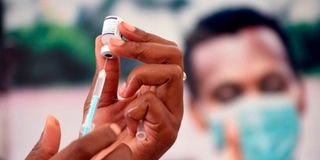Kemri urges MoH to change Covid-19 vaccination approach

A health worker prepares to administer Covid-19 vaccination. The Kemri-Wellcome Trust Research Programme on Covid-19 has released new results highlighting the need for countries to adjust their approach to vaccinations.
The Kemri-Wellcome Trust Research Programme on Covid-19 has released new results highlighting the need for countries to adjust their approach to vaccinations.
Researchers modelled a broad range of Covid-19 vaccine scale-up scenarios and tested each for cost-effectiveness and their impact on the spread of the disease.
The analysis found that Kenya’s vaccination campaign against the disease can achieve greater value for money if it focuses on the elderly rather than on the whole population.
“This new data suggests that we can fight Covid more effectively by refocusing our efforts on those who need it most,” said Prof Edwine Barasa, director of Kemri’s Nairobi research programme.
Ensuring older adults and other at-risk groups receive vaccines quickly, he said, is the best way to achieve greater health outcomes and is better value for money.
“We hope this data helps policymakers across the continent determine how to structure impactful, cost-effective, long-term Covid-19 responses,” he added.
These forecasts show what would happen if vaccine scale-up reached 30, 50or 70 percent of the Kenyan population, under both slow (18-month) and rapid (six-month) scenarios. A no vaccination scenario was modelled as a baseline. In all cases, the model scales up vaccination to adults over 50 before extending it to the broader population.
New infections
“Under both the slow and rapid scale-up scenarios, reaching 30% coverage with priority given to adults over 50, averts a substantial number of new infections and deaths – 32 per 100,000 new infections in the 18-month scenario, and 39 per 100,000 in the rapid scenario; as well as ~8,100 or ~9,400 deaths respectively,” the researchers said.
“Reaching a threshold of 50% and subsequently 70% would avert an additional ~1,100 deaths under the slow scenario, and an additional ~400 deaths in the rapid scenario.”
Countries need to refocus their Covid-19 vaccination programmes on the kinds of strategies that will save more lives for less money, said Justice Novignon, head of the Africa Centres for Disease Control’s Health Economics Unit.
“This is especially in settings with overall low risk of severe disease and death and high natural immunity, and constrained resources as is the case in Kenya and Africa, targeting the elderly and those with risk increasing comorbidities rather than to the whole population.”
Researchers found that scaling up vaccine coverage to 30 percent is highly cost effective, while the 50 and 70 percent scenarios were not, given the lower risk of severe disease and death and high natural immunity due to previous exposure.
“This critical analysis can help us sharpen our focus as we try to balance Covid vaccination campaigns with other essential health programmes,” said Prof Joachim Osur, public health specialist and the vice-chancellor at Amref International University.





